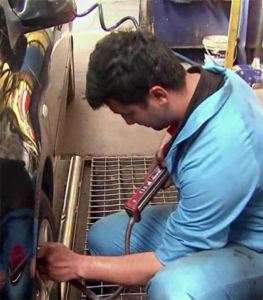New initiative streamlining refugee settlement
Refugee clients are being supported to settle faster and more sustainable thanks to a new settlement support initiative that better coordinates services supporting new arrivals.
Refugee and migrant settlement agency AMES Australia has implemented the Individual Pathways Plan (IPP) as a way of bringing together the refugee service areas of settlement and orientation, education and employment.
 The initiative is now also being rolled out at AMES Australia’s sites across Melbourne.
The initiative is now also being rolled out at AMES Australia’s sites across Melbourne.
AMES Australia Humanitarian Settlement Program (HSP) Case Manager Claude Sadaka has been working on the IPP project for a year.
“It took a while to create the form on Microsoft Teams as we based it on discussions with clients about their goals and desired pathways,” Claude said.
“We had support and input from some of AMES’ employment work brokers, education counsellors as well as settlement case managers,” she said.
“The main point of all of this was for us all to work together to provide the best service for our clients and to support them to settle faster and more sustainably,” Claud said.
HSP Case Manager Latifeh Maghsoudi has also been involved in the IPP from the beginning.
“The idea was to integrate and innovate and get everyone working better together and we have achieved that. The IPP is delivering faster and better settlement outcomes through hard work and teamwork,” Latifeh said.
“We are also seeing the clients embrace it. They find it easier and they don’t need to tell their stories multiple times to people supporting them in the different branches of AMES, such as education and employment. We’ve essentially created a ‘one stop shop’ for settling refugee clients,” she said.
“It’s a win-win situation from every aspect – for the clients, for settlement, education and employment staff and for the future of the project,” Latifeh said.
HSP Team Leader Jess Ferguson says although the IPP project is now being rolled out, it is still evolving.
“We are still working to fine tune things to bring the three service areas together and integrate employment, settlement and education,” Jess said.
“We can do this because now we have the tools and we have the platform to be able to share information across teams. We are at the point where we are rolling out the program and more and more staff are actually working on IPP. We hope it will become the norm across AMES,” she said.
“In the initial stages, we planned to test the program with 10 clients but we actually got 18. The clients immediately saw the value in it and were talking to each other about it.
“It’s been a complicated process with a few steps forward and one back but now we are seeing the benefits of it,” Jess said.
Work Broker Jane Tierney said the IPP was making clients think about their futures and pathways available to them.
“Clients who might have just focused initially on learning English are now thinking about where they ultimately want to go in terms on education, training or employment, in some case from day one,” Jane said.
“It is also encouraging people who are newly arrived to want to continue with AMES and to learn what other program we offer,” she said.
One client, Afghan refugee ‘Alex’, has effectively been fast tracked into his chosen pathway of becoming a mechanic through being referred into the IPP.
“I came to Australia five months ago with my wife and three children. I worked as a mechanic in Afghanistan but I don’t have qualifications for Australia,” Alex said.
He was interested in pursuing the same career in Australia so he was referred to the Refugee Mentoring Program and he attended workshops and job skills sessions.
Alex was linked with IPP, received mentoring and enrolled in study is a short period of time. He is now doing a pre-apprenticeship course and is on his pathway to a career within five months of arrival.
“I am very happy to be starting a new life here in Australia and I’m looking forward to my future,” Alex said.












